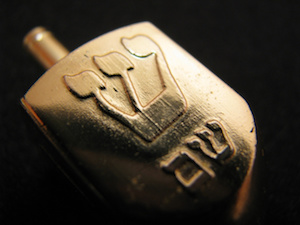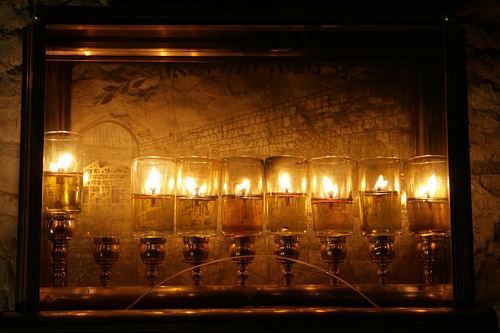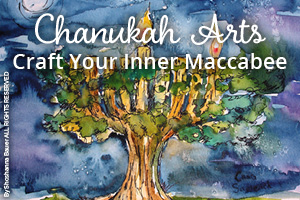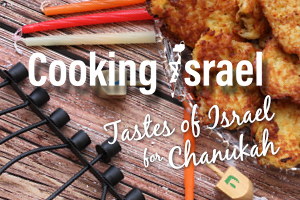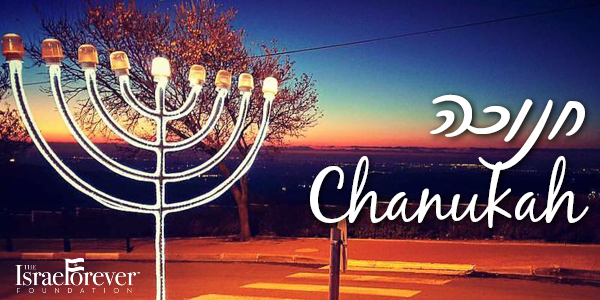8 Short Thoughts for 8 Chanukah Nights
Rabbi Sacks, community leader and former Chief Rabbi of the United Kingdom, has become known for his sharing of wisdom for Jews around the world. He has written eight short thoughts, one for each night of Chanukah. Print and read one with your family just before you light your own Chanukah lights this year, Share the graphics on social media and spread the light, or send to your community educators and encourage them to utilize these important messages for their learners of all ages.
Chanukah sameach!
1. INSPIRED BY FAITH, WE CAN CHANGE THE WORLD
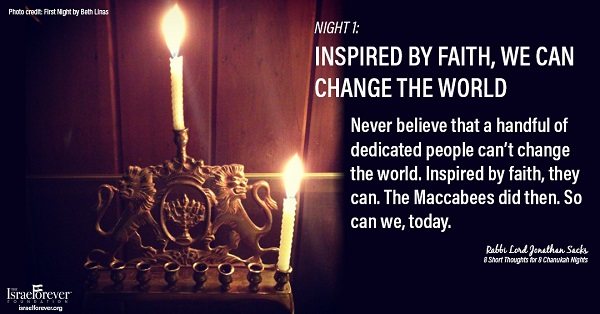
Twenty-two centuries ago, when Israel was under the rule of the empire of Alexander the Great, one particular leader, Antiochus IV, decided to force the pace of Hellenisation, forbidding Jews to practice their religion and setting up in the Temple in Jerusalem a statue of Zeus Olympus. This was too much to bear, and a group of Jews, the Maccabees, fought for their religious freedom, winning a stunning victory against the most powerful army of the ancient world. After three years they reconquered Jerusalem, rededicated the Temple and relit the menorah with the one cruse of undefiled oil they found among the wreckage.
It was one of the most stunning military achievements of the ancient world. It was, as we say in our prayers, a victory of the few over the many, the weak over the strong. It’s summed up in wonderful line from the prophet Zechariah: not by might nor by strength but by my spirit says the Lord. The Maccabees had neither might nor strength, neither weapons nor numbers. But they had a double portion of the Jewish spirit that longs for freedom and is prepared to fight for it.
Never believe that a handful of dedicated people can’t change the world. Inspired by faith, they can. The Maccabees did then. So can we, today.
FOOD FOR THOUGHT
What are some values we associate with the Maccabees? How can we carry the Maccabee spirit into our lives today?
2. THE LIGHT OF THE SPIRIT NEVER DIES
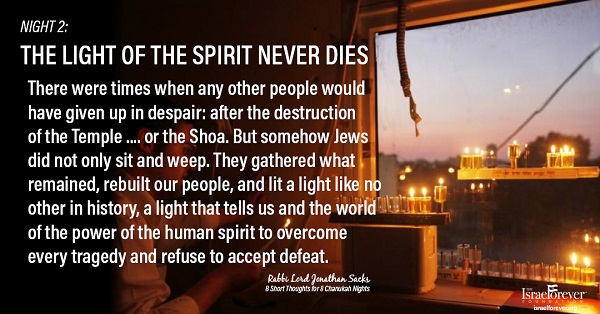
There’s an interesting question the commentators ask about Chanukah. For eight days we light lights, and each night we make the blessing over miracles: she-asah nissim la-avotenu. But what was the miracle of the first night? The light that should have lasted one day lasted eight. But that means there was something miraculous about days 2 to 8; but nothing miraculous about the first day.
Perhaps the miracle was this, that the Maccabees found one cruse of oil with its seal intact, undefiled. There was no reason to suppose that anything would have survived the systematic desecration the Greeks and their supporters did to the Temple. Yet the Maccabees searched and found that one jar. Why did they search? Because they had faith that from the worst tragedy something would survive. The miracle of the first night was that of faith itself, the faith that something would remain with which to begin again.
So it has always been in Jewish history. There were times when any other people would have given up in despair: after the destruction of the Temple, or the massacres of the crusades, or the Spanish Expulsion, or the pogroms, or the Shoa. But somehow Jews did not only sit and weep. They gathered what remained, rebuilt our people, and lit a light like no other in history, a light that tells us and the world of the power of the human spirit to overcome every tragedy and refuse to accept defeat.
From the days of Moses and the bush that burned and was not consumed to the days of the Maccabees and the single cruse of oil, Judaism has been humanity’s ner tamid, the everlasting light that no power on earth can extinguish.
FOOD FOR THOUGHT
What does being an Eternal Nation mean? What is the implication, positive or negative, of that title? What is a belief, faith, or hope that helps keep you going even during challenging times?
3. CHANUKAH IN TIMES OF GOOD AND BAD
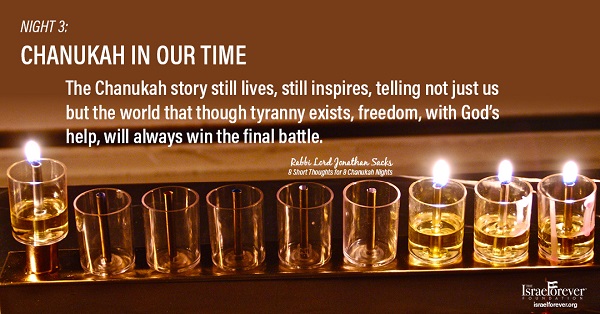
Back in 1991 I lit Chanukah candles with Mikhail Gorbachev, who had, until earlier that year, been president of the Soviet Union. For seventy years the practice of Judaism had been effectively banned in communist Russia. It was one of the two great assaults on our people and faith in the twentieth century. The Germans sought to kill Jews; the Russians tried to kill Judaism.
Under Stalin the assault became brutal. Then in 1967, after Israel’s victory in the Six Day War, many Soviet Jews sought to leave Russia and go to Israel. Not only was permission refused, but often the Jews concerned lost their jobs and were imprisoned.
Around the world Jews campaigned for the prisoners, Refuseniks they were called, to be released and allowed to leave. Eventually, Mikhail Gorbachev realized that the whole Soviet system was unworkable. Communism had brought, not freedom and equality, but repression, a police state, and a new hierarchy of power. In the end, it collapsed, and Jews regained the freedom to practice Judaism and to go to Israel.
That day in 1991 after we had lit candles together, Mr. Gorbachev asked me, through his interpreter, what we had just done. I told him that twenty-two centuries ago in Israel after the public practice of Judaism had been banned, Jews fought for and won their freedom, and these lights were the symbol of that victory. And I continued: Seventy years ago, Jews suffered the same loss of freedom in Russia, and you have now helped them to regain it. So you have become part of the Chanukah story. And as the interpreter translated those words into Russian, Mikhail Gorbachev blushed.
The Chanukah story still lives, still inspires, telling not just us but the world that though tyranny exists, freedom, with God’s help, will always win the final battle.
FOOD FOR THOUGHT
While we light proudly today, Jews have lit Chanukah candles during some of the toughest periods of their history.
What is the significance of the Chanukah story to the story of the Jewish people? What difficulties are you facing, personally or communally, that you hope your candles will be a prayer towards overcoming?
4. THE FIRST CLASH OF CIVILISATIONS
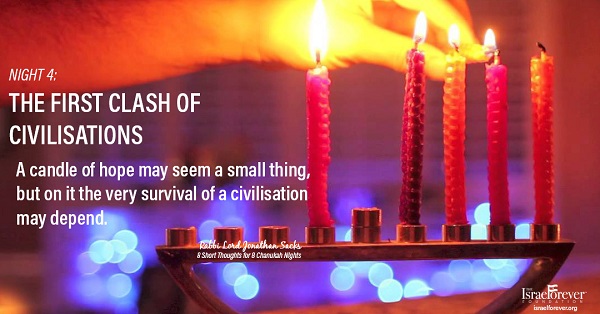
One of the key phrases of our time is the clash of civilisations. And Chanukah is about one of the first great clashes of civilisation, between the Greeks and Jews of antiquity, Athens and Jerusalem.
The ancient Greeks produced one of the most remarkable civilisations of all time: philosophers like Plato and Aristotle, historians like Herodotus and Thucydides, dramatists like Sophocles and Aeschylus. They produced art and architecture of a beauty that has never been surpassed. Yet in the second century before the common era they were defeated by the group of Jewish fighters known as the Maccabees, and from then on Greece as a world power went into rapid decline, while the tiny Jewish people survived every exile and persecution and are still alive and well today.
What was the difference? The Greeks, who did not believe in a single, loving God, gave the world the concept of tragedy. We strive, we struggle, at times we achieve greatness, but life has no ultimate purpose. The universe neither knows nor cares that we are here.
Ancient Israel gave the world the idea of hope. We are here because God created us in love, and through love we discover the meaning and purpose of life.
Tragic cultures eventually disintegrate and die. Lacking any sense of ultimate meaning, they lose the moral beliefs and habits on which continuity depends. They sacrifice happiness for pleasure. They sell the future for the present. They lose the passion and energy that brought them greatness in the first place. That’s what happened to Ancient Greece.
Judaism and its culture of hope survived, and the Chanukah lights are the symbol of that survival, of Judaism’s refusal to jettison its values for the glamour and prestige of a secular culture, then or now.
A candle of hope may seem a small thing, but on it the very survival of a civilisation may depend.
FOOD FOR THOUGHT
One of the early names for the Jewish people is Ivri, translated as “the other”.
How are Jews the same or different from other nations, and how does that impact world history and culture? Have you ever felt personally that “being a Jew” made others view or treat you differently?
5. THE LIGHT OF WAR AND THE LIGHT OF PEACE
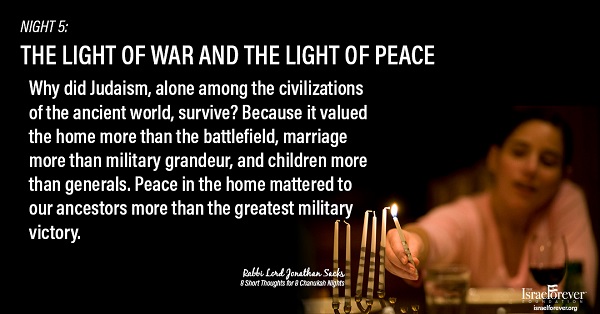
There is a law about Chanukah I find moving and profound. Maimonides writes that ‘the command of Chanukah lights is very precious. One who lacks the money to buy lights should sell something, or if necessary, borrow, so as to be able to fulfill the mitzvah.’
The question then arises, What if, on Friday afternoon, you find yourself with only one candle? What do you light it as — a Shabbat candle or a Chanukah one? It can’t be both. Logic suggests that you should light it as a Chanukah candle. After all, there is no law that you have to sell or borrow to light lights for Shabbat. Yet the law is that, if faced with such a choice, you light it as a Shabbat light. Why?
Listen to Maimonides: ‘The Shabbat light takes priority because it symbolises shalom bayit, domestic peace. And great is peace because the entire Torah was given in order to make peace in the world.’
Consider: Chanukah commemorates one of the greatest military victories in Jewish history. Yet Jewish law rules that if we can only light one candle — the Shabbat light takes precedence, because in Judaism the greatest military victory takes second place to peace in the home.
Why did Judaism, alone among the civilizations of the ancient world, survive? Because it valued the home more than the battlefield, marriage more than military grandeur, and children more than generals. Peace in the home mattered to our ancestors more than the greatest military victory.
So as we celebrate Chanukah, spare a thought for the real victory, which was not military but spiritual. Jews were the people who valued marriage, the home, and peace between husband and wife, above the highest glory on the battlefield. In Judaism, the light of peace takes precedence over the light of war.
FOOD FOR THOUGHT
What does it mean to be a “moral” army, like the IDF? Have you ever been forced to do something in conflict with your moral principles? How do you cope with that?
6. THE THIRD MIRACLE
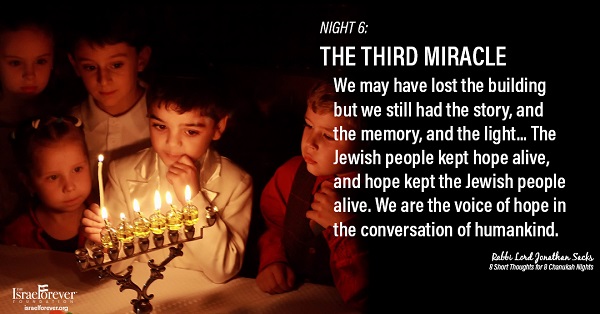
We all know the miracles of Chanukah, the military victory of the Maccabees against the Greeks, and the miracle of the oil that should have lasted one day but stayed burning for eight. But there was a third miracle not many people know about. It took place several centuries later. After the destruction of the second Temple, many rabbis were convinced that Chanukah should be abolished. After all, it celebrated the rededication of the Temple. And the Temple was no more. It had been destroyed by the Romans under Titus. Without a Temple, what was there left to celebrate?
The Talmud tells us that in at least one town, Lod, Chanukah was abolished. Yet eventually the other view prevailed, which is why we celebrate Chanukah to this day.
Why? Because though the Temple was destroyed, Jewish hope was not destroyed. We may have lost the building but we still had the story, and the memory, and the light. And what had happened once in the days of the Maccabees could happen again. And it was those words, od lo avdah tikvatenu, “our hope is not destroyed,” became part of the song, Hatikvah, that inspired Jews to return to Israel and rebuild their ancient state. So as you light the Chanukah candles remember this. The Jewish people kept hope alive, and hope kept the Jewish people alive. We are the voice of hope in the conversation of humankind.
FOOD FOR THOUGHT
How can we celebrate even during dark times? How can we hold on to our hope and our faith even when it is challenged?
7. INSIDE / OUTSIDE
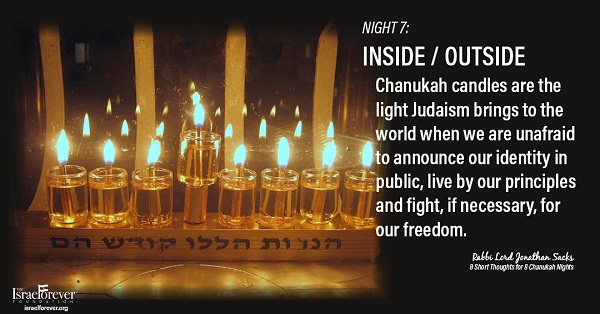
There is more than one command in Judaism to light lights. There are three. There are the Shabbat candles. There is the havdalah candle. And there are the Chanukah candles. The difference between them is that Shabbat candles represent shalom bayit, peace in the home. They are lit indoors. They are, if you like, Judaism’s inner light, the light of the sanctity of marriage and the holiness of home.
The Chanukah candles used to be lit outside — outside the front door. It was only fear of persecution that took the Chanukah candles back inside, and in recent times the Lubavitcher Rebbe introduced the custom of lighting giant menorahs in public places to bring back the original spirit of the day.
Chanukah candles are the light Judaism brings to the world when we are unafraid to announce our identity in public, live by our principles and fight, if necessary, for our freedom.
As for the havdalah candle, which is always made up of several wicks woven together, it represents the fusion of the two, the inner light of Shabbat, joined to the outer light we make during the six days of the week when we go out into the world and live our faith in public.
When we live as Jews in private, filling our homes with the light of the Shekhina, when we live as Jews in public, bringing the light of hope to others, and when we live both together, then we bring light to the world.
There always were two ways to live in a world that is often dark and full of tears. We can curse the darkness or we can light a light, and as the Chassidim say, a little light drives out much darkness. May we all help light up the world.
FOOD FOR THOUGHT
The Jews are called “a light unto the nations”.
How can we bring more light to the world? What can we do to combat the darkness and the hate? How do you actively bring light and hope into both public and private spheres?
8. TO LIGHT ANOTHER LIGHT
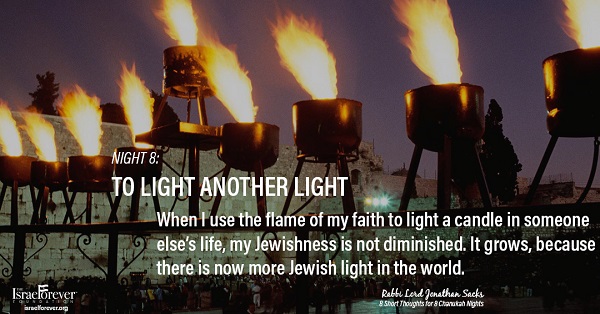
There’s a fascinating argument in the Talmud. Can you take one Chanukah light to light another? Usually, of course, we take an extra light, the shamash, and use it to light all the candles. But suppose we don’t have one. Can we light the first candle and then use it to light the others?
Two great sages of the third century, Rav and Shmuel, disagreed. Rav said No. Shmuel said Yes. Normally we have a rule that when Rav and Shmuel disagree, the law follows Rav. There are only three exceptions and this is one.
Why did Rav say you may not take one Chanukah candle to light the others?
Because, says the Talmud, ka mach-chish mitzvah. You diminish the first candle. Inevitably you spill some of the wax or the oil. And Rav says: don’t do anything that would diminish the light of the first.
But Shmuel disagrees, and the law follows Shmuel. Why?
The best way of answering that is to think of two Jews: both religious, both committed, both living Jewish lives. One says: I must not get involved with Jews who are less religious than me, because if I do, my own standards will fall. I’ll keep less. My light will be diminished. That’s the view of Rav.
The other says No. When I use the flame of my faith to light a candle in someone else’s life, my Jewishness is not diminished. It grows, because there is now more Jewish light in the world. When it comes to spiritual goods as opposed to material goods, the more I share, the more I have. If I share my knowledge, or faith, or love with others, I won’t have less; I may even have more. That’s the view of Shmuel, and that is how the law was eventually decided.
So share your Judaism with others. Take the flame of your faith and help set other souls on fire.
FOOD FOR THOUGHT
What does Judaism mean to you? What can you learn from other Jews who may relate differently? In what ways can you help spread your light, your faith, and your knowledge with those around you?

